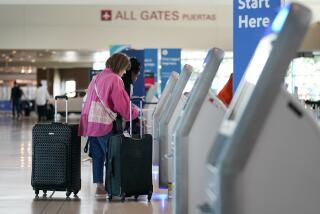Panel OKs Phase-Out of Noisy Old Planes
- Share via
WASHINGTON — House and Senate negotiators agreed in last-minute discussions Friday to require the federal government to phase out flights of noisy older aircraft and dampen the racket in the skies over the nation’s airports by the turn of the century.
The accord, expected to receive final congressional approval today, will allow Los Angeles International Airport, Orange County’s John Wayne Airport and other regional airports to retain existing local noise controls and possibly to impose new ones.
The conference committee agreement would also allow local airport officials to levy a “head tax” of up to $12 per round trip to pay for expansion or construction projects. The so-called passenger facility charges are expected to generate as much as $1 billion nationally every year for airport improvements.
Transportation Secretary Samuel K. Skinner hailed the compromise bill, saying it “represents the strategic vision this country needs to boost our economy and meet consumer demand in the 1990s and into the 21st Century.”
Both the noise policy and the passenger charges were key parts of the Administration’s legislative agenda, as outlined in Skinner’s national transportation policy last spring. The compromise agreement, which will be folded into the broad federal budget package scheduled for final action today, brings to a close a week of talks between Senate and House negotiators on legislation to reauthorize the Federal Aviation Administration.
Under the compromise, the government will be required to develop a federal noise policy that would force out older and noisier “Stage 2” aircraft by Dec. 31, 1999. About 2,000 of the nation’s airplanes are classified as Stage 2, which denotes a second-generation plane with engines that are noisier than more recently developed Stage 3 planes.
The anti-noise policy would permit the Transportation Department to review--and apparently accept or reject, at its discretion--future local restrictions on Stage 3 aircraft.
In recent years, regional airport officials have imposed varying restrictions governing Stage 2 aircraft noise in their communities. Those local policies have become a recent source of irritation between federal and local aviation authorities.
Federal officials and airline carriers have said that the “patchwork” of local noise policies has made it difficult to manage the national air transit network.
The compromise would allow existing noise ordinances at local airports to remain in place under a grandfather clause included in the legislation. Officials from LAX and John Wayne have lobbied lawmakers not to do away with their noise policies.
The agreement would also allow local officials to impose new restrictions on Stage 2 planes, although it would require them to provide the FAA with 180 days advance notice.
The agreement would require that the fleets of the nation’s carriers must be 85% Stage 3 planes by July 1, 1999, and 100% by the end of the century.
The provision of the legislation authorizing passenger facility charges will change existing federal law, which prohibits airport officials from collecting a passenger tax to finance local construction projects.
More to Read
Sign up for Essential California
The most important California stories and recommendations in your inbox every morning.
You may occasionally receive promotional content from the Los Angeles Times.













